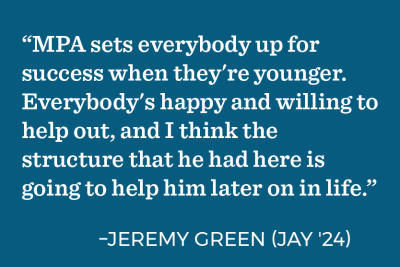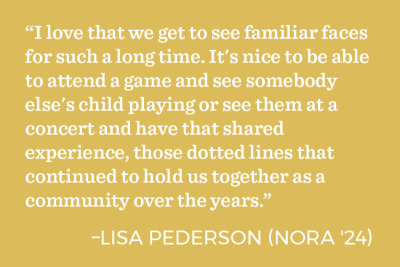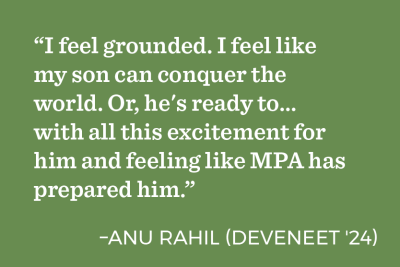July 12, 2024
 Parents of Lifers are those who chose MPA for their children every year for all 13 years of their education. Right before they graduated from MPA, we interviewed the Class of 2024 Lifers in a group reflection on their MPA journeys. After hearing their touching reflections, filled with gratitude for MPA, advice, and optimism for the future, led us to further expand on the conversation to their parents.
Parents of Lifers are those who chose MPA for their children every year for all 13 years of their education. Right before they graduated from MPA, we interviewed the Class of 2024 Lifers in a group reflection on their MPA journeys. After hearing their touching reflections, filled with gratitude for MPA, advice, and optimism for the future, led us to further expand on the conversation to their parents.
How has MPA’s community supported and shaped your child?
Lisa (Nora ’24): For my kids, I think the opportunity to do a substantial amount of fine arts. They both played in instrumental groups as well as choirs. Athletics has been just a great opportunity–one child did three sports and the other did two.
Katie (Ben ’24): It’s being able to do everything. I felt a fair amount of pressure in high school–which happened to be public high school–and I thought I got a really fabulous education, but I had to do more picking. It was kind of like, “Well, you’re either devoted to this program or you’re going to be devoted to this program.” And I feel like Ben has gotten an opportunity to do a lot of different things. There’s flexibility and a willingness, too. That’s helped make him more well-rounded. In other places, he would’ve dropped off some of these things and really lost out on what is going to end up being life-changing, and now things that I would’ve never imagined him continuing to do in college, he’s going to try to continue to do in college.
Mike (Molly ’24): Being a younger sibling and the kid of an employee, Molly doesn’t remember ever not coming here. She was carried here certainly before she was walking. In her particular case, the community shaped her even in all the time she wasn’t yet a student here. It’s the place where she was always known and looked out for. We’ll take a lot of what happened outside the classroom as much as anything would happen inside.
Mark (Hunter ’24): I think the size. Hunter had the opportunity to do pretty much whatever he wanted and it was good to know that people are always looking out and saying, “Keep moving forward,” because I know kids can get lost in the shuffle.
Jeremy (Jay ’24): Jay’s been able to do so many things. A lead in a play, choir, jazz band, and multiple sports. I always tell him being able to be a big fish in a little pond sometimes is a good thing, because you get to be able to try everything. That has been very special here, those opportunities.
 Kristi (Jay ’24): The opportunities he’s had across the board. I don’t think he would’ve been in a school play if he was at a different school. And selfishly, I already knew that there were outstanding teachers here–some of them that I had!–so I knew from the get-go what he was getting into and how it was going to help him flourish in school, because I feel like that’s a huge piece too–knowing how supportive and invested all these outstanding teachers are.
Kristi (Jay ’24): The opportunities he’s had across the board. I don’t think he would’ve been in a school play if he was at a different school. And selfishly, I already knew that there were outstanding teachers here–some of them that I had!–so I knew from the get-go what he was getting into and how it was going to help him flourish in school, because I feel like that’s a huge piece too–knowing how supportive and invested all these outstanding teachers are.
How has MPA has prepared your child for academic, professional, and personal success–however you define success as a family?
Jeremy (Jay ’24): It’s a well-oiled machine. MPA sets everybody up for success when they’re younger. They have the tools to be a good and kind student. Everybody’s happy and willing to help out, and I think the structure that he had here is going to help him later on in life. Going to Macalester, he has a really strong base and he’s going to be able to do well there.
Mark (Hunter ’24): I asked Hunter his thoughts beforehand, and he said he thought the theater program in Lower School was fantastic. I noticed that when the football captains had their speeches at the end of the season, Jay and Hunter spoke so eloquently. I think talking to adults as students really makes a big difference. They’re going to succeed down the road.
Mike (Molly ’24): One thing that I think is distinct here is what happens with college counseling. There was never pressure on either of my kids to make anything other than the best choice for them. And I do think schools like us often get pigeonholed into, ‘How many can we get into this elite school?’ I think there’s an institutional commitment to making the right choice for kids.
Lisa (Nora ’24): Public speaking. Just recently, I saw one of the Lower School events getting all lined up to go into the Recital Hall to recite their nursery rhymes, and I remembered Evan and Nora having to lead their own conferences in fourth grade. And of course, everything culminates with senior speeches. The kind of confidence that they develop in presenting their ideas, not only having to speak in front of others but preparing for that and pulling their ideas together, is really impressive from the standpoint of what skills this gives them, not just for college, but for life.
We just had an alum stop in and I asked, “What surprised you about college?” They said, “Well, not only am I far above my peers in being able to write, but I can speak. So few of them are able to get in front of a class and talk or are uncomfortable showing up to office hours and interacting with the teacher that way. My professors love me because I come to office hours.” That seed is planted so early here and it’s built on. That’s a really valuable skill they immerse in.
Katie (Ben ’12): One niche skill that’s really important is getting really high-quality feedback and then being able to use that feedback to turn it into something better. The teachers have the time and the ability to do that. So when they go to college and they get feedback, they know what to do with it, they know to respond, they know to ask for it, and they know how to follow up. But it’s because people here took the time with them and showed them how to be better writers, better speakers, and thinkers.
What makes this community so strong?
Lisa (Nora ’24): I love that we get to see familiar faces for such a long time. I’m a graduate of an enormous public high school in the west suburbs. didn’t really have a concept of what that kind of community could mean for my own kids. It’s nice to be able to attend a game and see somebody else’s child playing or see them at a concert and have that shared experience, those dotted lines that continued to hold us together as a community over the years. And, there’s room to change. I think because they get to try so many things, they don’t necessarily kind of take on one identity in the community. They love that.
 Mark (Hunter ’24): The teachers know the kids. We ran into Mr. Wilson at the Spring Auction and he knew who we were, even though that was second grade. The fact that everybody keeps track of all these kids– it’s nice that they have some sort of investment in them succeeding.
Mark (Hunter ’24): The teachers know the kids. We ran into Mr. Wilson at the Spring Auction and he knew who we were, even though that was second grade. The fact that everybody keeps track of all these kids– it’s nice that they have some sort of investment in them succeeding.
What would you tell another family who was considering the PreK-12 investment?
Lisa (Nora ’24): For me, it’s hands down the teaching. The opportunity to develop as a person and the skills that I mentioned earlier are really important. But for my kids, knowing that regardless of whatever their post-secondary plans would have turned out to be–and now I have one at a big public university and one going to a tiny liberal arts college–I was absolutely confident that they were going to get exposed to phenomenal teaching and learning and active classrooms here. I wanted them to be active learners. I wanted them to have a high bar and I wanted them to be exposed to all kinds of ideas before they began the process of narrowing it down again to focus on something.
Kristi (Jay ’24): And all the opportunities that they start in kindergarten. All those extra pieces of learning beyond the classroom are brought into the building–that’s huge.
Anu (Devneet ’24): I would say the teaching and the empathy. I’ve had three very different kids who will most likely all be Lifers here, and every kid is met at their personalities, their drive, their academics, and their emotional pieces. We couldn’t have asked for anything better. My son has come so far from the kid that he was in elementary school, who would hide behind a blanket and refuse to introduce himself to a single soul, and yet knew the name of every kid in his class. And now he is going away to college, away from all of us, from things he knows, and he made that decision like, “You know what? It’s going to be good for me. It’s great and this place has prepared me for it.” So I really believe that that’s a function of the school more than anything else.
Mike (Molly ’24): I would say once you’re here, you tend to not want to leave. There are a lot of really good neighborhood elementary schools, but there aren’t a lot of neighborhood middle schools where there are going to be 45 peers in your grade.
Mark (Hunter ’24): Safety. Sending your kid here, it’s safe. There was never any concern with bullying. And, opportunity. Hunter played basketball because his friend played basketball. He wasn’t a great basketball player, but he never would’ve played on any other team at another school. Same with football. So just the fact that everybody had the opportunity to play and earned the development.
Katie (Ben ’24): I would encourage them to trust this place. Kind of what you’re saying–it’s safe. It is in the most basic way, but in much bigger ways, so they can be themselves and they can be kind, which I think some kids, in some places, just don’t feel safe enough to be kind.
What role have athletics played in the development of your Lifers?
Kristi (Jay ’24): Leadership opportunities for sure. Jay had some awesome leadership opportunities that he probably wouldn’t have had in a bigger environment. And, it gave him confidence.
Lisa (Nora ’24): I think it’s been great that Nora’s been able to do sports year-round instead of having to be specialized. I’m so glad for that more well-rounded experience.
Mike (Molly ’24): I am not the parent of the athletic child in this room, but still, Coach Sheehan came and asked her if she wanted to manage the softball team. That was a good reminder that you can still be involved. And I have pictures of her being the entire cheering section at a basketball or volleyball game before other kids arrived from sports of their own. It gave her a social outlet. For the kids who are either watching or just participating at a casual level, there’s a lot to offer, too.
Katie (Ben ’24): I think some of Ben’s finest adult mentorships have come out of our sports programs. Actually, it’s alums who have come back and coached. They’ve done some of the most remarkable things, which I actually think speaks to the strength of the community. Ben doesn’t collapse very often after the end of a race, but he walked out of the chute and he just keeled over after State cross country, and Declan (’18) was kneeling over him. From fifth grade, I taught Declan very early on, and watching him grow up and then take care of my own child, it kind of doesn’t get any better than that. A really good community that made that happen, and that was really powerful for me.
Lisa (Nora ’24): Coach Bev Docherty emailed about Nora when she was the Athena Award winner this year. I mean, how long has Bev Docherty been gone? She only coached her once, in eighth or ninth grade.
What’s one word that you would use to describe what it’s like to be a parent of a Lifer?
Mark (Hunter ’24): Dedicated. We had the opportunity to pull our kids at any time, but saw the light at the end of the tunnel.
Jeremy (Jay ’24): Unbelievable.
 Lisa (Nora ’24): I am struggling to find the one word. It’s a mixture of calm and satisfied.
Lisa (Nora ’24): I am struggling to find the one word. It’s a mixture of calm and satisfied.
Katie (Ben ’24): I’m at peace with it. And I don’t know that very many people describe themselves as being at peace with anything in their eighteen-year-old’s life. It’s a very tumultuous time, but it’s like, “Okay, he’s where he needs to be.” And maybe that’s just what we really want as parents.
Mike (Molly ’24): “Inevitable” was the word when I realized what happens here for kids, and then subsequently I had a kid of my own, there was no doubt that this was where those two kids would go to school.
Lisa (Nora ’24): I actually worried a little bit about having both my kids come through and have me as the college counselor. But there was not one single day where we had a problem. That’s been a huge, unanticipated gift for me to have been able to see my kids in the building and to have stayed out of each other’s way just enough so that they could have their experience, and I could do my job, and that we could still not just love, but I think like each other.
Anu (Devneet ’24): I feel grounded. I feel like my son can conquer the world. Or, he’s ready to. I’m excited for him. And even though as a parent you feel this kind of sadness, most of it is just this burgeoning with all this excitement for him and feeling like MPA has prepared him.